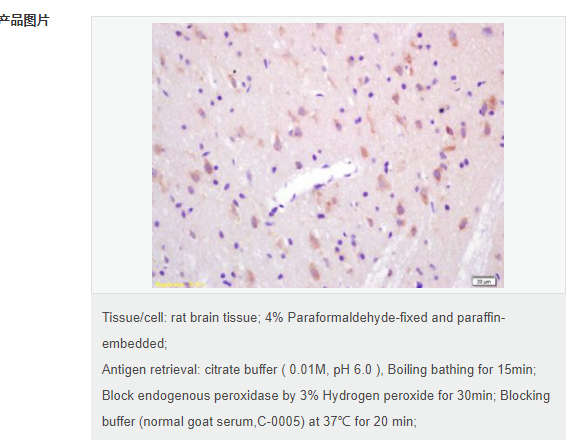

貨號
產(chǎn)品規(guī)格
售價
備注
BN41043R-100ul
100ul
¥2360.00
交叉反應(yīng):Rat,Mouse,Human(predicted:Horse,Pig,Dog,Chicken) 推薦應(yīng)用:WB,IHC-P,IHC-F,IF,Flow-Cyt,ELISA
BN41043R-200ul
200ul
¥3490.00
交叉反應(yīng):Rat,Mouse,Human(predicted:Horse,Pig,Dog,Chicken) 推薦應(yīng)用:WB,IHC-P,IHC-F,IF,Flow-Cyt,ELISA
產(chǎn)品描述
| 英文名稱 | KAT2B |
| 中文名稱 | 組蛋白乙酰轉(zhuǎn)移酶PCAF抗體 |
| 別 名 | GCN5; PCAF; CAF; CREBBP associated factor; GCN5; GCN5L; GCN5L1 antibody Histone acetylase PCAF; Histone acetyltransferase KAT2B; Histone acetyltransferase PCAF; K(lysine) acetyltransferase 2B; KAT2B; KAT2B_HUMAN; Lysine acetyltransferase 2B; P antibody P/CAF; p300/CBP associated factor; P300/CBP-associated factor; Pcaf. |
| 研究領(lǐng)域 | 免疫學(xué) 信號轉(zhuǎn)導(dǎo) 細(xì)胞周期蛋白 轉(zhuǎn)錄調(diào)節(jié)因子 |
| 抗體來源 | Rabbit |
| 克隆類型 | Polyclonal |
| 交叉反應(yīng) | Human, Rat, (predicted: Mouse, Chicken, Dog, Pig, Horse, ) |
| 產(chǎn)品應(yīng)用 | WB=1:500-2000 ELISA=1:5000-10000 IHC-P=1:100-500 IHC-F=1:100-500 Flow-Cyt=1ug/Test IF=1:100-500 (石蠟切片需做抗原修復(fù)) not yet tested in other applications. optimal dilutions/concentrations should be determined by the end user. |
| 分 子 量 | 92kDa |
| 細(xì)胞定位 | 細(xì)胞核 細(xì)胞漿 |
| 性 狀 | Liquid |
| 濃 度 | 1mg/ml |
| 免 疫 原 | KLH conjugated synthetic peptide derived from human KAT2B:451-550/832 |
| 亞 型 | IgG |
| 純化方法 | affinity purified by Protein A |
| 儲 存 液 | 0.01M TBS(pH7.4) with 1% BSA, 0.03% Proclin300 and 50% Glycerol. |
| 保存條件 | Shipped at 4℃. Store at -20 °C for one year. Avoid repeated freeze/thaw cycles. |
| PubMed | PubMed |
| 產(chǎn)品介紹 | Functions as a histone acetyltransferase (HAT) to promote transcriptional activation. Has significant histone acetyltransferase activity with core histones (H3 and H4), and also with nucleosome core particles. Inhibits cell-cycle progression and counteracts the mitogenic activity of the adenoviral oncoprotein E1A. In case of HIV-1 infection, it is recruited by the viral protein Tat. Regulates Tat's transactivating activity and may help inducing chromatin remodeling of proviral genes. Function: Functions as a histone acetyltransferase (HAT) to promote transcriptional activation. Has significant histone acetyltransferase activity with core histones (H3 and H4), and also with nucleosome core particles. Inhibits cell-cycle progression and counteracts the mitogenic activity of the adenoviral oncoprotein E1A. In case of HIV-1 infection, it is recruited by the viral protein Tat. Regulates Tat's transactivating activity and may help inducing chromatin remodeling of proviral genes. Subunit: Interacts with SIRT1. Interacts (unsumoylated form) with NR2C1; the interaction promotes transactivation activity (By similarity). Interacts with EP300, CREBBP and DDX17. Interacts with NCOA1 and NCOA3. Component of a large chromatin remodeling complex, at least composed of MYSM1, KAT2B/PCAF, RBM10 and KIF11/TRIP5. Interacts with NR2C2 (hypophosphorylated and unsumoylated form); the interaction promotes the transactivation activity of NR2C2. Binds to HTLV-1 Tax. Interacts with and acetylates HIV-1 Tat. Interacts with KLF1; the interaction does not acetylate KLF1 and there is no enhancement of its transactivational activity. Interacts with NFE4. Interacts with MECOM. Interacts with E2F1; the interaction acetylates E2F1 augmenting its DNA-binding and transcriptional activity. Subcellular Location: Nucleus. Tissue Specificity: Ubiquitously expressed but most abundant in heart and skeletal muscle. Similarity: Belongs to the GCN5 family. Contains 1 bromo domain. Contains 1 N-acetyltransferase domain. SWISS: Q92831 Gene ID: 8850 Database links: Entrez Gene: 8850 Human Entrez Gene: 18519 Mouse Omim: 602303 Human SwissProt: Q92831 Human SwissProt: Q9JHD1 Mouse Unigene: 533055 Human Unigene: 255025 Mouse Unigene: 483572 Mouse
Important Note: This product as supplied is intended for research use only, not for use in human, therapeutic or diagnostic applications |
